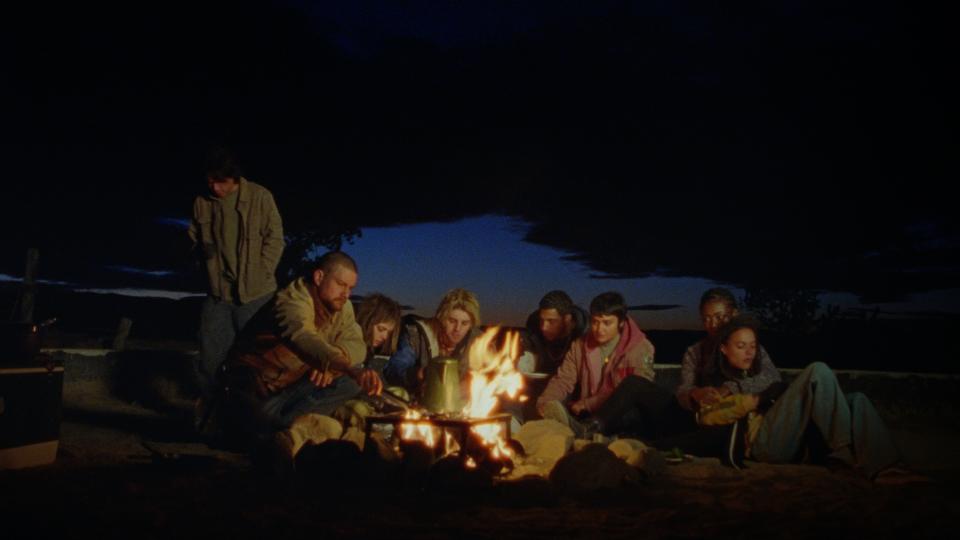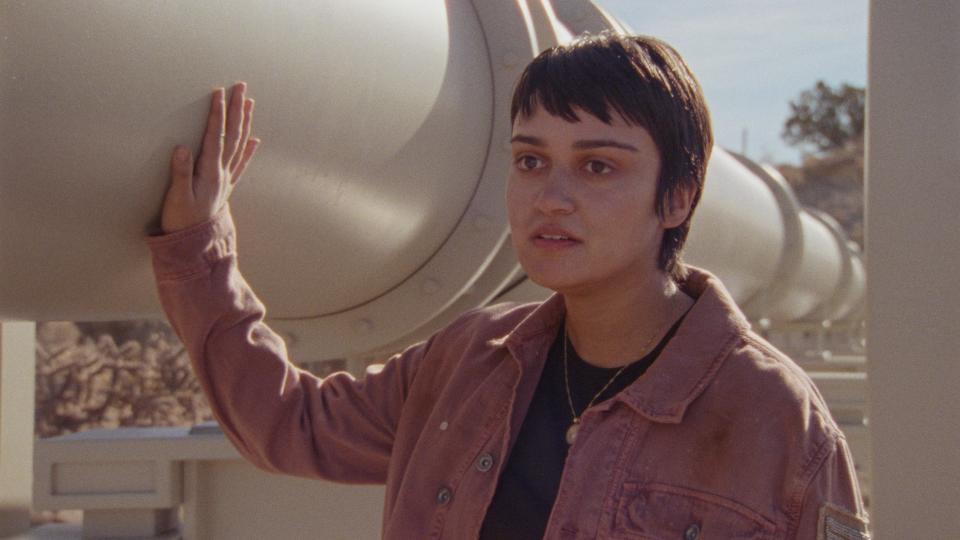Ariela Barer Talks ‘How to Blow Up a Pipeline’

Ariela Barer knows that the title of her new film, and the book on which it’s based, is a conversation starter. So much so that she and her “How to Blow Up a Pipeline” cowriters Jordan Sjol and Daniel Goldhaber worked on the project in secret — sort of.
“I was making fun of myself the other day. I saw this meme that was like, ‘Just letting you all know I’m making moves in silence,’” says Barer early one afternoon in Brooklyn, New York, in the days before the film’s release. The actress was gearing up for several screenings and panel discussions about the eco-thriller, which debuted at the Toronto Film Festival last year.
More from WWD
“The reality of the situation was we talked to everyone about it. Every person we met, we’d be like, ‘We’re making a movie. Do you know anyone? Do you wanna help?’” adds Barer, seated at a picnic table near a cluster of production studios in the Greenpoint section of Brooklyn. “Look, it was more that we waited on a press announcement because we knew — because of the subject matter of the movie — a longer space between the announcement of the movie and people being able to see the movie would lead to a type of speculation that wasn’t what we wanted the conversation to be.”

The film is a fictional and narrative adaptation of Swedish professor Andreas Malm’s 2020 climate change manifesto, which makes the case for eco-terrorism as an answer to escalating environmental devastation. Goldhaber, who directed the film as his follow-up to psychological horror film “Cam”; Sjol, and Barer were holed up together during the pandemic when the book was published, and they saw the potential for a heist movie in its text.
“The industry was kind of dead, and we were questioning what our place in the world was. We all cared about these [environmental] movements, but also felt like we were a bunch of useless artists who didn’t know what to do,” says Barer, who was in the process of developing a film with Goldhaber before the pandemic lockdowns. “We’d all been on the ground with several different climate movements and social movements of the time, and all of it just seemed to get squashed by the arm of the state, and it felt really bleak.”

While inspired by the book’s message, Barer notes the privileged perspective that often accompanies idealism. Destroying an oil pipeline would cause gas prices to rise, but at whose expense? “Yes, oil is evil and causing all this damage, but the people that would be immediately affected by that have to be accounted for when considering an action like this,” Barer says. “And so it was those conversations between us that started to form a narrative and character-driven tension.”
The concept for the film evolved from propaganda to ensemble drama-thriller. “From the beginning, we had the idea of if this was us and our friends who did this, what would that look like?” Barer adds.

The movie costars a who’s-who of emerging actors, including Sasha Lane; Lukas Gage; Kristine Froseth; Jayme Lawson; Forrest Goodluck, and Marcus Scribner. Barer leads the film as the group’s ringleader, Xochitl, who becomes increasingly radical in the wake of personal climate tragedy and brings the ragtag group together to sabotage a pipeline in Texas.
“We realized we had an opportunity for the author of the movie to also be the author of the plan, and for that to be a bit of self-reflection on our role in making this movie,” Barer says of taking on her character. “What type of ego puts themself as the face of a movement like this, and is that legitimate? Is that necessary? Does that complicate things? So that exploration enriches the movie and the role.”

The actress, who’s in her early 20s and is currently based in Brooklyn, grew up in Los Angeles in a creative family that encouraged her interest in film from an early age. Barer had her breakout role in Marvel’s “Runaways” series for Hulu, and she notes that she’s at a place in her career where she’s been able to carve out a sense of agency in terms of the projects she takes on. While she plans to continue acting, her focus is moving increasingly behind the camera; she’s currently developing a film that she hopes will become her directorial debut.
“How to Blow Up a Pipeline” has received mostly positive critical reviews since its festival premiere, and Barer says she hasn’t been too surprised about how different audiences have reacted to it.
“Once people see the movie, I think as long as they’re engaging in earnest with the ideas in good faith, I haven’t been too surprised, even by criticism,” she says. “An academic text like that is meant to provoke, it’s meant to get people talking about the ideas, and we knew that the movie would exist to do that too, just in a more narrative driven way.
“[The answer to climate change] is never gonna be that simple,” she continues. “In a system we all to varying extents participate in, to shut it down is going to have costs — but also to not shut it down will likely have more. So what do we do?”

Best of WWD


